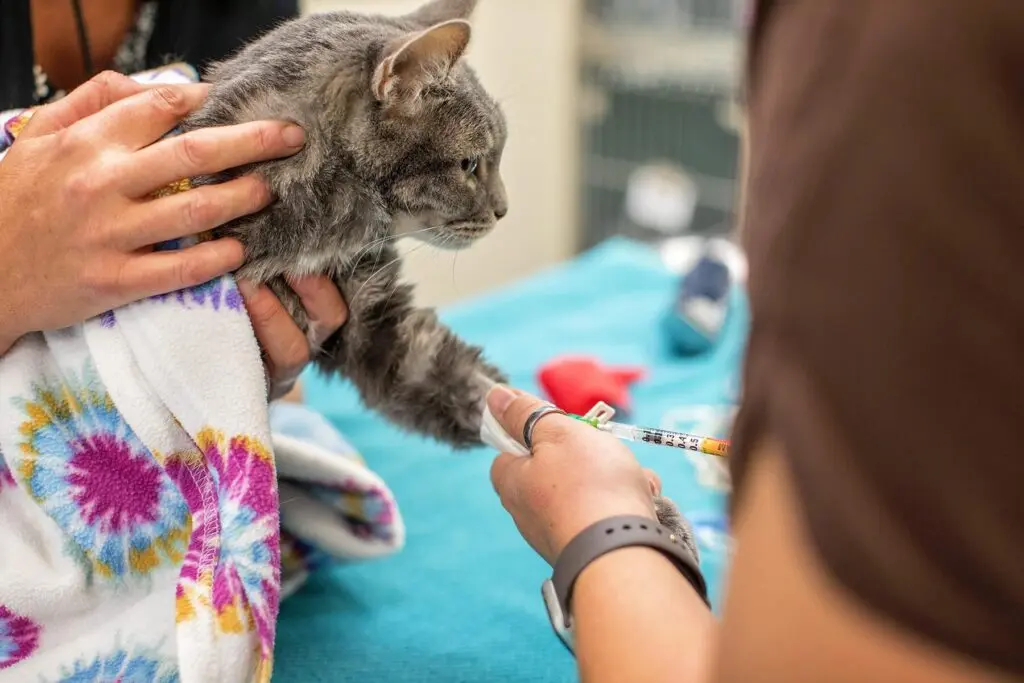If you’re a blood donor, you may be aware that January is National Blood Donor Month. While the Red Cross focuses on human donors, the beginning of the year is a good time for pet owners to remember that animals can also need transfusions due to illness or injuries. The animal blood banks are looking for donors as well.
When it comes to pet transfusions, it can be particularly difficult to find blood donors for cats. Take a look at a few things that you should know about feline blood donation, then find out whether or not your cat could become a blood donor.
Feline Blood Types
If you know anything about human blood types, you probably know that there are four major types (A, B, AB, and O) and each type can be either positive or negative, resulting in possibly eight blood types. Feline blood types are less complex, and cats only have three possible blood types: A, B, and AB.
Unlike humans, there is no universal donor or universal receiver when it comes to feline blood types. If a cat receives a transfusion, receiving the wrong type of blood could be fatal. That means that if you wanted to make a direct blood donation (for example, if you wanted your cat to donate to a friend’s cat who needed a transfusion) rather than donating to a blood bank, you would need to be certain that both cats were of the same blood type.
In cats, type A blood is the most common, while type B is uncommon, and type AB is very rare. Certain cat breeds such as Siamese, Turkish Angora, and Sphynx cats almost always have the same blood types, but always consult with your veterinarian before assuming any blood type. Your veterinarian will be able to type your cat’s blood, or can refer you to a lab that can perform the test.
Requirements for Feline Donors
In order for your cat to be considered to be a blood donor, they have to meet certain requirements. One important requirement is that donor cats must be indoor only cats. Cats can catch serious communicable illnesses from other cats. Therefore cats that are allowed to roam free outside are considered too high-risk to be donors.
A donor cat must be up-to-date on their vaccinations and healthy. If your cat takes any regular medication other than flea, tick, and heartworm prevention medication, they will not be eligible to donate. The blood bank will also have certain age and weight requirements for donors.
Finally, most blood banks prefer cats that are fairly friendly and comfortable being handled. This is to prevent stress on your cat and the staff. If your cat is aggressive and prone to biting and clawing during their veterinary exams and checkups, then your vet will probably not recommend that your cat become a blood donor.
Preparing Your Cat to Donate Blood
If your cat meets all the requirements to donate blood and you decide to go ahead with the donation, you’ll need to make sure that your cat is properly prepared for the donation procedure.
Because we do not want your cat to become stressed and unhappy, cats are sedated while they give blood. The doctor will use injectable sedation to relax your cat and make the experience more pleasant. The good news is that this means your cat won’t experience any discomfort or stress during their donation.
However, this does mean that your vet will probably recommend that your cat not eat before the procedure. You can feed them the night before the donation, but then you’ll need to put the food away until after the donation.
You can, however, make water available to your cat right up until the donation. In fact, the better hydrated your cat is, the smoother the process is likely to be.
Collecting your cat’s blood will only take about 10-15 minutes, but because your cat will need to be sedated, the entire process is likely to take a few hours. In many cases, you can drop off your pet while you run errands or do something else, and come back to pick them up later.
You may want to leave a favorite toy or other comfort object for your cat to have. In most cases, your cat will be fed at the donation center shortly after the procedure. Some blood banks also offer toys or other treats for cats that act as donors.
Just like humans, cats that donate blood can be lifesaving heroes for other cats who need transfusions, as well as the owners of those cats. If you’re interested in finding out how your cat can become a blood donor, talk to your veterinarian.

